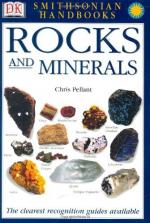|
This section contains 1,048 words (approx. 4 pages at 300 words per page) |

|
Minerals are the basic materials which make up the earth's crust. Most rocks are combinations of minerals. A mineral can be either a chemical element or a chemical compound and is defined as a natural, inorganic, crystalline solid.
Each mineral has its own characteristic chemical composition and can be identified by its properties. These properties, which include hardness, crystalline structure, luster, and color, are a result of the way the atoms in a particular mineral are held together.
Over 3,000 different minerals are known to exist on earth. Of these, only about 20 are considered common. These are the "rock-forming" minerals. Ten of these minerals alone make up 90% of the mass of the earth's crust. These ten minerals are quartz, orthoclase, plagioclase, muscovite, biotite, calcite, dolomite, halite, gypsum, and the ferromagnesian minerals. Minerals that are not rock-forming are known as "accessory" minerals.
Minerals can be divided into two main groups...
|
This section contains 1,048 words (approx. 4 pages at 300 words per page) |

|


